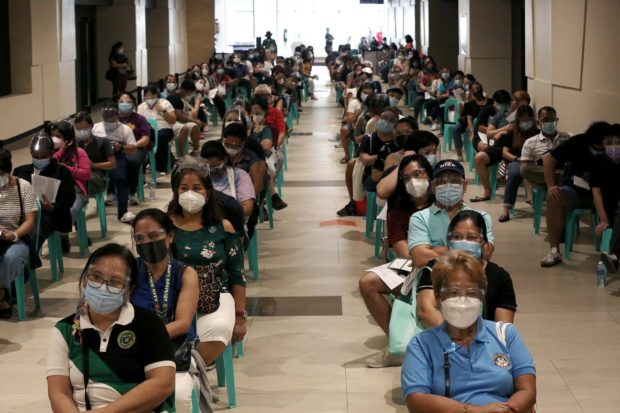
SOCIAL DISTANCING Residents queue to receive their second dose of AstraZeneca at a vaccination site inside a mall in Parañaque City. — RICHARD A. REYES
MANILA, Philippines — The government will start vaccinating frontline workers on Monday. There are an estimated 35.5 million workers in the identified “essential” sectors.
“There will be a ceremonial rollout of vaccination for the A4 group,” Health Secretary Francisco Duque III said on Sunday, using the designation for vaccine priority workers.
“It is crucial that we already start vaccinating them as they are our economic front-liners,” he added.
The official vaccination drive began on March 1 among health workers (A1), then the elderly (A2) and adults with existing illnesses (A3).
Official figures showed 1.4 million out of the 1.55 million health workers have received at least their first dose.
On the other hand, only 1.3 million out of the 9.4 million elderly and 1.1 million out of the 14.5 million adults with medical risks have received at least one of two doses.
Meanwhile, 10,827 front-line workers have been given at least one dose even though the vaccination for the group has yet to officially start.
The Department of Health (DOH) reported 7,228 new laboratory-confirmed COVID-19 cases on Sunday, pushing the total to 1,269,478.
It also reported 166 more deaths due to COVID-19, of whom 109 were previously tagged as recoveries, pushing total deaths to 21,898.
59,337 active cases
The DOH declared 7,372 more recoveries based on its protocol of automatic recovery for mild and asymptomatic cases after a two-week quarantine, bringing the number of survivors to 1,188,243.
The country still has 59,337 active cases, of which 93.5 percent were mild, 2.4 percent asymptomatic, 1.15 percent moderate, 1.7 percent severe and 1.3 percent critical.
The DOH said 13.2 percent of the 43,442 persons who were tested were found positive for the coronavirus. Three laboratories, however, did not submit their data.
The National Task Force Against COVID-19 has commended measures to encourage more people to avail of the COVID-19 vaccine by providing nonmonetary incentives.
These “techniques or incentive programs” by local governments to raffle off groceries, farm animals, and even a house and lot, help address vaccine hesitancy, which immunization chief implementer Secretary Carlito Galvez Jr. said remains a “challenge.”
In the private sector, some businesses offered exclusive discounts or gifts to vaccinated customers, Galvez said in a statement on Sunday.
‘In-kind incentives’
Health systems specialist Dr. Albert Domingo, in a separate interview, said “in-kind incentives” are examples of “nudges” that could help convince a hesitant person to finally get a vaccine.
“Of course, we still need to address deeper reasons for hesitancy so that these ‘nudges’ will be effective. Deeper reasons include the lack of information about how vaccines save lives, or having the wrong information about vaccine safety and side effects—matters that require not just better information but also improved delivery of this information through the best channels of communication,” Domingo said.
Interior Secretary Eduardo Año cited local governments, which have come up with “outside the box” ideas to encourage more people to avail of COVID-19 vaccines.
He cited in particular San Luis town, Pampanga’s “Baka para sa Bakuna (A cow for a vaccine),” where a cow would be raffled off monthly starting July for inoculated residents. Barangay Sucat in Muntinlupa City holds weekly raffles for vaccinated residents who can win 25 kilograms of rice.